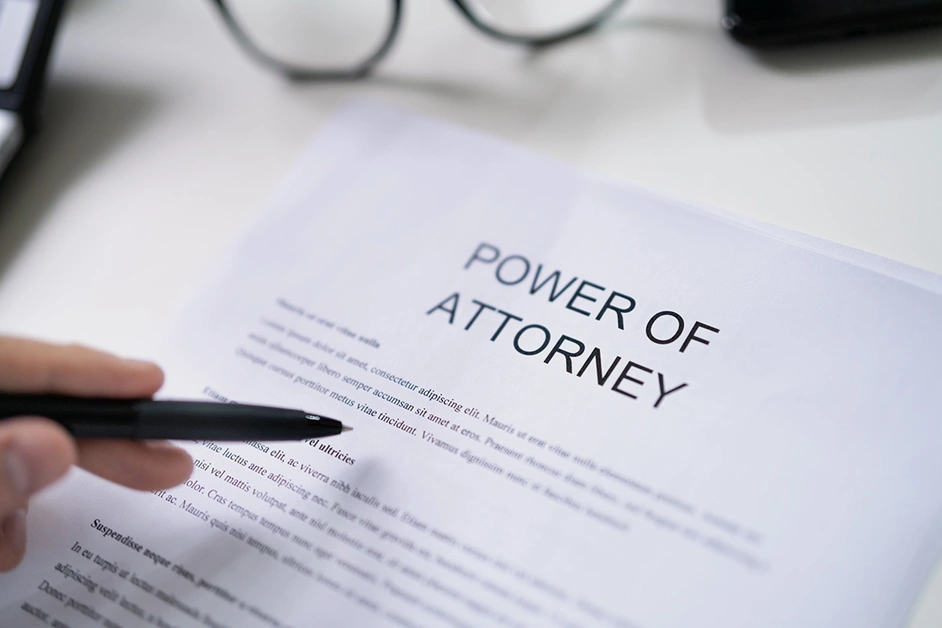Power of Attorney for Property: What You Must Know

A power of attorney helps you manage medical, property and financial affairs. Want to know more about the power of attorney for property and how it works? We've curated this comprehensive guide to give you a broader aspect of power of attorney, including requirements for registration, types of power of attorney, steps to create a power of attorney, and how it can be revoked and terminated.
What is the Power of Attorney for Property?
A Power of Attorney (POA) is a legal document that empowers an individual (referred to as the principal or grantor) to entrust authority to another person (the agent or attorney-in-fact) to make decisions related to their property. It grants a wide range of actions, including managing real estate assets, handling financial matters, medical affairs and executing property transactions such as sales or purchases.
How Does Power of Attorney for Property Work?
The legal concept of power of attorney for property enables an individual to assign authority to another person or an agent for managing their tangible assets for a predetermined time. This entails the completion of a formal legal document, which is then signed and notarized to validate its legality.
The agent is granted broad decision-making powers over all assets. The validity of a property Power of Attorney requires the presence of two witnesses at the time of signing.
Power of Attorney for Property: Documents for Registration
- Passport-size photos of both the parties
- Proof of address of the parties;
- Identification documents like driving licenses, voter ID cards, and Aadhaar cards.
- Property Tax Receipt, Index II, or Electricity Bill (if POA is related to property).
Power of Attorney for Property: Formats and Templates
Online and Legal Service Resources
A Power of Attorney doesn't have any particular format; it is customisable and can be adjusted to meet the principal's requirements, ensuring that the outcomes comply with legal standards. However, it is crucial to exercise caution when utilising online templates, as legal intricacies may vary depending on local laws.
Legal and Financial Implications for POA
The Power of Attorney for property holds legal and financial significance for all parties concerned. The attorney-in-fact assumes significant responsibilities and potential liabilities. The agent is legally obligated to act in the grantor's best interests, handling property affairs with diligence and ethics.
Things to Include in Power of Attorney for Property
When drafting the General Power of Attorney for property, caution must be exercised while incorporating clauses.
- Grantor Details: Name, age, address, and occupation of the individual conferring the power (Grantor).
- Attorney Details: Name of the attorney, age, address, father's name and occupation of the person to whom the power is granted (Attorney).
- Reason for Giving Power: A clear justification for granting the power must be explicitly stated, such as residing abroad or being hospitalised.
- Details of Powers granted: Details of what the Attorney is authorised to do about the property and explicitly specify any limitations.
- Date and Place: Date and location of drafting the POA deed, and specifically state the commencement date for the operation of the power separately.
- Signature of Grantor: The grantor must sign at the end of the document and at the bottom of each page.
- Signature of Two Witnesses: Two witnesses must sign the document, providing their names, addresses, phone numbers, and the date, confirming that they have seen the Grantor signing the deed.
Who is Involved in a Power of Attorney for Property?
Principal/ Donor/ Grantor
The principal/donor/grantor holds the authority of a power of attorney. To become a principal in India, an individual must meet the following conditions:
- Must be at least 18 years old;
- Mentally sound;
- Must be free from any legal disability, like insanity, or lunacy.
Agent
An agent known as an attorney-in-fact, is a person on whom the principal's rights are vested and authorised to act on behalf of a principal. Individuals aged 18 or above with legal rights and certain reputable financial institutions may act as agents.
Notary Public and Witnesses
For proper execution, the Power of Attorney should be signed by the principal in front of the signatures of two witnesses. To be a witness, a person must have attained 18 years of age, be of sound mind, and not be a party to the POA.
Lawyer
To initiate the process, the principal should begin by seeking the services of a lawyer in their state of residence. If the legal fees associated with this are high, an alternative is to visit a legal services office.
Steps to Create Power of Attorney for Property
Step 1: Determine Purpose and Choose the Agent
Identify the purpose and extent of drafting a Power of Attorney and mention the particular powers to be granted to the agent regarding a property. These powers may include the power of property management, sales, leasing, mortgages, or other activities related to real estate. Following this, choose the agent or attorney-in-fact in favour of whom the Power of Attorney is to be prepared.
Step 2: Drafting the Power of Attorney Document
The Power of Attorney document mentions the details of the grantor and the agent, while the background may specify the purpose behind executing such a POA. The 'powers & responsibilities' section particularly states the specific actions the agent is empowered to perform on behalf of the grantor, explicitly defining the extent of authority. It also outlines the duration of the document's validity and the conditions under which it can be terminated.
Step 3: Review and Revise the Draft
This step ensures that the language used in the Power of Attorney is clear, free of ambiguity, and accurately represents the grantor's intentions. Any uncertainties or inconsistencies should be addressed in this phase to avoid potential complications.
Step 4: Signature, Execution, Notarization
After completing the content, the document must be signed by both the parties, i.e. the grantor and the agent. If it is required under the local laws, it is executed in the presence of witnesses. Depending on the jurisdiction, these signatures may be required to be notarised by a 'notary public' to validate authenticity.
Revocation and Termination of Power of Attorney
To revoke the Power of Attorney (POA), the grantor must create a formal revocation document that specifies the intention to revoke the existing POA.
The document should be signed, dated, and notarised. A copy of the revocation must be furnished to the agent, financial institutions, and any other relevant stakeholders to ensure clarity and prevent unauthorized actions.
The revocation must be informed timely to the agent and relevant third parties, as it is essential to prevent any ongoing actions by the agent. All the legal formalities must be adhered to establish the legitimacy of the revocation. Once revoked, the agent's authority is completely terminated, and the original Power of Attorney loses its legal validity.
A Power of Attorney (POA) is revocable as long as the principal remains mentally sound, and it is automatically terminated upon the principal's death.
Legal Steps to Ensure Revocation
Revocation processes may differ depending on the jurisdiction, and it is crucial to follow legal requirements to prevent further complications. The parties must seek advice from legal professionals when revoking a Power of Attorney as they can guide the process, ensuring compliance with applicable laws.
Types of Power of Attorney
Conventional/General Power of Attorney
A general power of attorney grants significant powers to an appointed agent for managing the principal's affairs about the property over which the powers have been given. The authorised agent is responsible for various responsibilities, including acquiring or selling real estate and entering into contractual agreements on behalf of the principal.
Limited or Special Power of Attorney
For those seeking to restrict the agent's authority, opting for a limited or special power of attorney is advisable. Before endorsing and notarising a limited power of attorney, the person must provide details regarding the specific responsibilities assigned to the agent.
Durable Power of Attorney
A durable power of attorney (POA) is prepared to be in effect for a lifetime. In this kind, the agent of the POA retains the authority to make decisions even if the grantor becomes incapacitated or unfit to do so. Typically, a durable POA persists until the grantor dies or decides to revoke the POA.
Springing Power of Attorney
The springing power of attorney is executed in particular events, dates, or conditions and in cases where the grantor becomes incapable.
Medical/ Healthcare Power of Attorney
The medical power of attorney falls within the categories of both springing and durable power of attorney. Primarily used for healthcare decisions, the medical power of attorney only occurs when the grantor is conscious and in a sound state of mind and body.
Conclusion
What is the Power of Attorney for property? A Power of Attorney(POA) is a legal instrument that empowers an individual (referred to as the principal or grantor) to delegate authority to another person (the agent or attorney-in-fact) for making decisions related to their property.
How does a Power of Attorney for property work? A POA is a contract between the parties in which the principal's powers are granted to the agent; the instrument is signed by both parties, and the principal's signature is notarised.
Power of Attorney for property: Documents for registration
- Passport-size party photos
- Proof of address of the parties;
- Identification documents like driving licenses, voter ID cards, and Aadhaar cards.
- Property Tax Receipt, Index II, or Electricity Bill (if POA is related to property).
Power of Attorney for property: Formats and templates: A POA doesn't have any particular format; instead, these resources are customisable.
Things to include in a POA for property:
- Grantor Details
- Attorney Details
- Reason for Giving Power
- Details of Powers granted
- Date and Place
- Signature of Grantor
- Signature of Two Witnesses
Who is involved in a Power of Attorney for property: The parties involved in the making of a POA are the principal/grantor, agent, witness, notary public, and lawyer.
Steps to create Power of Attorney for property:
- Determine the purpose and choose the agent
- Drafting the POA document
- Review and revise the draft
- Signature, execution and notarisation
Revocation and termination of Power of Attorney: To revoke the Power of Attorney (POA), the grantor must adhere to specific procedures detailed in the original power of attorney document or according to local laws.
Types of Power of Attorney:
- Conventional/ General Power of Attorney
- Limited or Special Power of Attorney
- Durable Power of Attorney
- Springing Power of Attorney
- Medical Power of Attorney
FAQ's
A Power of Attorney(POA) is a legal instrument that empowers an individual (referred to as the principal or grantor) to delegate authority to another person (the agent or attorney-in-fact) for making decisions related to their property.
A POA is a contract between the parties in which the principal's powers are granted to the agent, both parties sign the instrument, and the principal’s signature is notarised. Then, the POA comes into effect, and the agent is responsible for all the acts mentioned in the POA relating to the property.
- Passport-size party photos
- Proof of address of the parties;
- Identification documents like driving licenses, voter ID cards, and Aadhaar cards.
- Property Tax Receipt, Index II, or Electricity Bill (if POA is related to property).
A POA doesn’t have any particular format; rather these resources are customizable that can be adjusted to meet individual requirements, ensuring that the outcomes comply with legal standards.
- Grantor Details
- Attorney Details
- Reason for Giving Power
- Details of Powers granted
- Date and Place
- Signature of Grantor
- Signature of Two Witnesses
The following are the steps involved in the creation of a Power of Attorney for Property:
- Determine the purpose and choose the agent
- Drafting the POA document
- Review and revise the draft
- Signature, execution, and notarization
Yes, a person can appoint more than one power of attorney.
Generally, a power of attorney remains valid till the principal’s life. Still, where there is a clause in the POA document specifying the time till when the POA is to remain effective, until such date, the POA will remain valid.
The following are the types of POA:
- Conventional/ General Power of Attorney
- Limited or Special Power of Attorney
- Durable Power of Attorney
- Springing Power of Attorney
- Medical Power of Attorney









